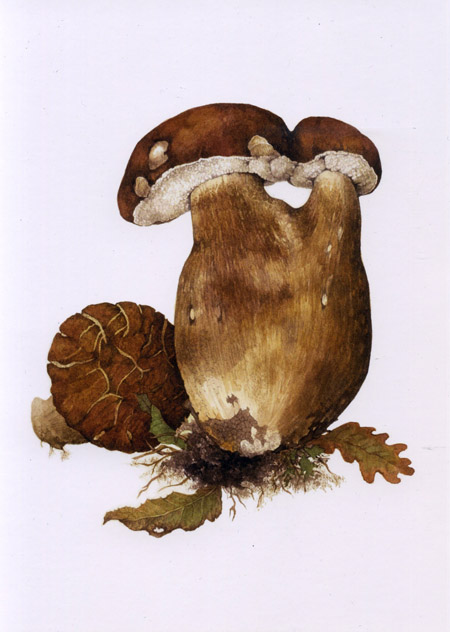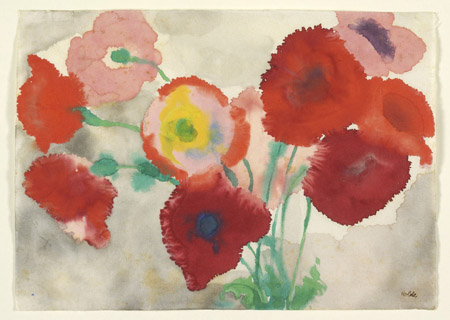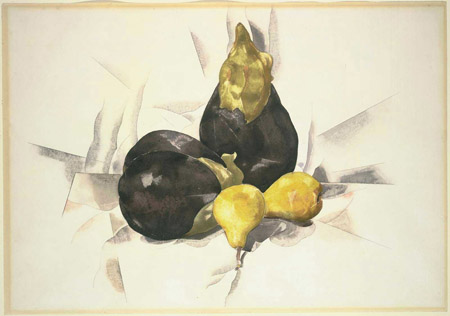(Katherine Manisco, “Porcini Mushrooms”)
Author Archives: dbv
noted
- William Gass on the St. Louis Arch.
- Joshua Beckman reviews Gabriel Josipovici’s After & Making Mistakes at the Jewish Chronicle (via This Space).
- Joel Brouwer on poetry books with conceptual hooks at Harriet.
- Georges Perec’s “Statement of Intent” (from Thoughts of Sorts) at the David R. Godine blog.
- Marion Boyars goes under.
red poppies
(Emil Nolde, Red Poppies (Roter Mohn), ca. 1920, Philadelphia Museum of Art.)
eggplants and pears
(Charles Demuth, Eggplants and Pears, 1925. Museum of Fine Arts, Boston.)
the real victims
“The most notable literary response to last year’s financial crisis was not to turn to the obvious genre – books about Wall Street shenanigans in the 1920s – but to skip several historical stages and to go straight to Ayn Rand’s 1957 novel Atlas Shrugged, in which heroic titans of industry are persecuted by a meddling government. The book’s sales skyrocketed in early 2009, proving that when bankers puff asset bubbles and wreck the world, a large part of the public can be counted on to learn from that experience that bankers are the real victims of society, presumably deserving even more tax cuts and deregulation.”
(Tom Frank, “The Red Scare Returns”.)
roussel / duchamp / cortázar / fassio
“Serious critics, of course, know that none of this is possible: in the first place, the Lyncée is an imaginary ship; secondly, Duchamp and Roussel never met. (Duchamp relates that he saw Roussel only once, in the Café La Régence, the one in the poem by César Vallejo, and that the author of Locus Solus was playing chess with a friend. ‘I am afraid I neglected to introduce myself,’ adds Duchamp.) But others do not allow these physical difficulties to obscure the truth of a more worthy reality. Not only did Duchamp and Roussel make the journey to [Buenos Aires] but they also met an echo from the future there, linked to them in ways that serious critics would likewise fail to credit. Juan Esteben Fassio prepared the ground by inventing in the heart of Buenos Aires a machine for reading the New Impressions of Africa during the same period when I, without knowing him, wrote Persio’s first monologues in The Winners, using a system of phonetic analogies inspired by Roussel; years later, Fassio attempted to fashion a new machine for reading Hopscotch, unaware that my most obsessive work during those years in Paris was with the obscure texts of Duchamp and the works of Roussel. A double impulse gradually converged upon the austral vertex where Roussel and Duchamp would meet once again in Buenos Aires, when an inventor and a writer – who perhaps years earlier had also watched each other across a cafe in the heart of the city, neglecting to introduce themselves – would meet through a machine conceived by the first to facilitate the reading of the second. If the Lyncée navigated the coasts of Africa, still some of its passengers reached our American shores, and the proof is in what follows, a short of joke designed to lead astray those who search for treasure with solemn faces.”
(Julio Cortázar, from “Of Another Bachelor Machine,” pp. 53–4 in Around the Day in Eighty Worlds.)
recounted lear
“In the two extremes (insufficient installation in ordinary circumstances and almost total rejection of the), the story sins through impermeability; it works with momentarily justified materials among which there is no osmosis, no convincing formulation. The good reader senses that none of these things had to be there, not the strangling hand, nor the gentleman who determines to spend the night in a desolate dwelling on a bet. This type of story, which deadens anthologies of the genre, recalls Edward Lear’s recipe for a pie whose glorious name I have forgotten: take a hog, tie it to a stake, and beat it violently, while at the same time preparing a gruel of diverse ingredients, interrupting its cooking only to continue beating the hog. If at the end of three days the glop and the hog have not formed a homogeneous substance, the pie must be considered a failure, the hog released, and the glop consigned to the garbage. Which is precisely what we do with stories in which there is no osmosis, where the fantastic and the ordinary are brought together without forming the pie we want to enjoy trembling.”
(Julio Cortázar, from “On the Short Story and Its Environs,” p. 167 in Around the Day in Eighty Worlds, trans. Thomas Christensen. Lear’s recipe is for Gosky Patties.)
noted
- At the Film Society of Lincoln Center, a tribute to Julio Cortázar as part of the Latinbeat Film Festival. (See also: Julio Cortázar reading Chapter 7 of Rayuela.)
- The opening sequence of Marguerite Duras’s India Song at A Small Gleaning Factory.
- A 1988 correction in the New York Times (cited in John Tierney’s piece on polar fraudulence).
the rise of capitalism
“Smoke, rain, abulia. What can the concerned citizen do to fight the rise of capitalism, in his own community? Study of the tides of conflict and power in a system in which there is structural inequality is an important task. A knowledge of European intellectual history since 1789 provides a useful background. Information theory offers interesting new possibilities. Passion is helpful, especially those types of passion which are non licit. Doubt is a necessary precondition to meaningful action. Fear is the great mover, in the end.”
(Donald Barthelme, “The Rise of Capitalism”.)
september 1–september 6
Books
- Stephen Wright, M31: A Family Romance
- Stacy Szymaszek, Emptied of All Ships
- Joseph McElroy, Ancient History: A Paraphase
- Julio Cortázar, 62: A Model Kit (trans. Gregory Rabassa)
Films
- Standard Operating Procedure, directed by Errol Morris


